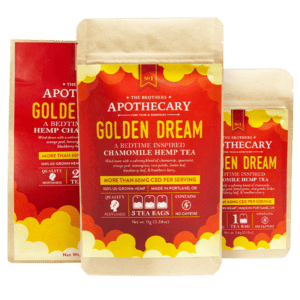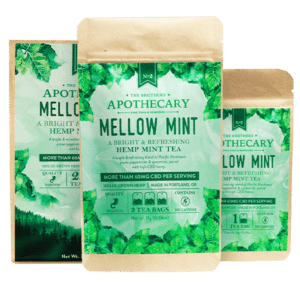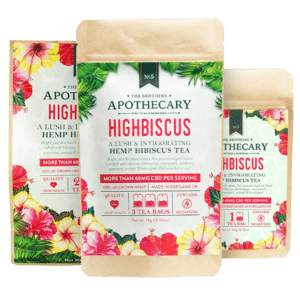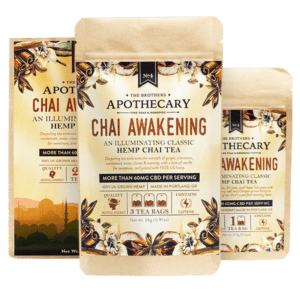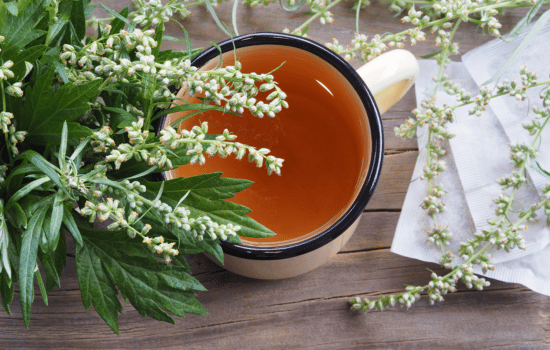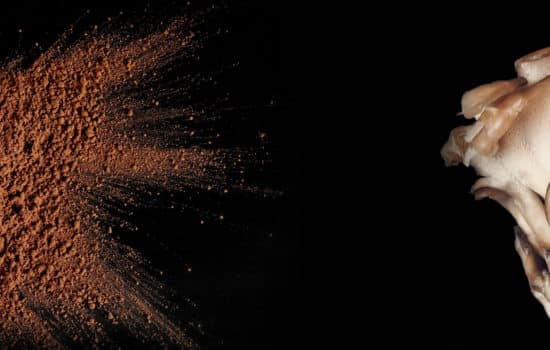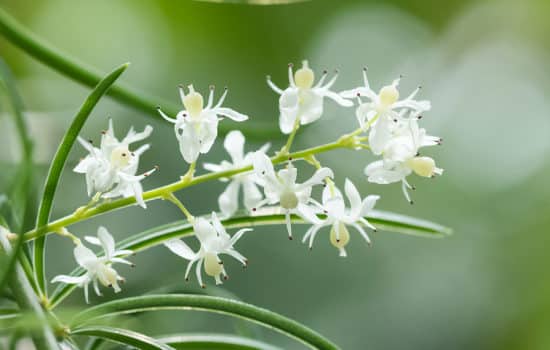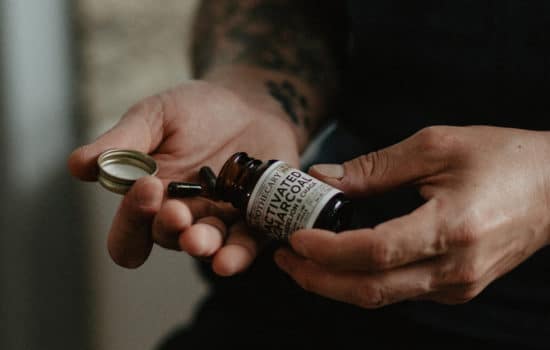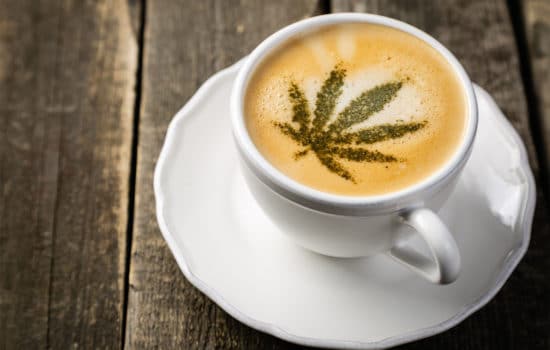You may have unknowingly seen the mullein plant on long drives or hikes, where the tall plants thrive in fields and embankments along the roadside and on trails. But did you know these visually unique plants also contain a wealth of wellness benefits?
The mullein plant may be the perfect companion when you’re not feeling so hot, as the plant compounds can help provide soothing relief. Here’s what to know.
What Is Mullein?
Mullein is a wild flowering plant harvested for thousands of years that serves many uses.
These plants can grow up to six feet tall, shooting off large, soft leaves. The mullein plant is known to produce a dense collection of yellow flowers that form the shape of an arrowhead atop the tall stem.
As a biennial plant, the Common Mullein, or Verbascum thapsus, takes two years to complete its life cycle. The fuzzy oval-shaped leaves form during the first year of growth, while the stem grows tall and the yellow flowers bloom during the second year.
Both the leaves and flowers of this luscious plant are edible and are commonly enjoyed in teas, mixed into salads, or even infused into liquors. In the 1800s, mullein elixirs were a popular supplement taken by people with tuberculosis.
Mullein has been used in traditional European herbal remedies for centuries, and consuming nutrient-rich mullein tea has been a practice to help soothe and nourish the body when feeling under the weather.
Beyond its many wellness benefits, mullein has another surprising and functional use: emergency toilet paper.
If you ever find yourself in a pinch, you can join a long line of predecessors by using the mullein’s velvety-soft long, gray-green leaves as toilet paper. This practice was so common that mullein has the nickname “Cowboy Toilet Paper.”
Another apt nickname, “the flannel plant,” further verifies how soft and luxurious feeling the mullein leaves can be when needed.
Mullein can also be a natural ingredient in hair dyes.
For edible teas and medicinal tinctures, the mullein leaves come from the bottom of the plant, and the mullein oil comes from the flowers or leaves. While you can enjoy fresh or dried mullein leaves, most use mullein tea bags.
Where Does Mullein Grow?
Mullein is native to Europe and Western Asia but exists in nearly every region. The name mullein comes from the German language, translating to “king’s candle,” paying homage to the plant’s candle-like shape and tall stance.
Encompassing over 200 species, the mullein plant can grow in all sorts of places. Mullein thrives in dry and sunny spaces. You are likely to spot the high yellow flowers of these tall plants blooming along roadsides and railroad tracks or in wide open fields.
Mullein flowers typically bloom in late spring and early summer. The blooming period lasts six weeks, with only a few flowers blossoming. By the end of the blooming period, mullein plants display an awe-inspiring collection of bright yellow flowers that stand tall above the ground.
What Does Mullein Taste Like?
Mullein has a mild aromatic profile that some have likened to light and earthy peppermint taste. The mullein flowers are slightly sweet, while the leaves have a subtle bitterness and an aftertaste of spice.
Many users prefer to incorporate dried flowers and leaves into mullein tea, helping to cut the bitterness of the beneficial leaves.
All About Mullein Tea
Humans have enjoyed mullein leaf tea for hundreds of years and continue to do so today. Sipping on caffeine-free mullein tea is one of our favorite ways to experience the benefits of mullein.
Is Mullein Tea Better Hot or Cold?
Whether you prefer your tea piping hot or refreshingly iced and sweetened, you can brew your mullein tea to fit your taste.
To make mullein tea, you’ll need:
- One to two teaspoons of dried mullein leaves or flowers (we recommend combining the flowers with the leaves if you prefer a sweeter flavor profile)
- One cup of water
- Strainer or tea infuser
- Optional: additives or sweeteners for a more complex flavor profile (a little dried spearmint and honey are some of our favorite ways to spruce up our mullein tea!)
Bring your water to a boil for hot tea and pour over your dried flowers and leaves. Let steep for at least 15 minutes before straining out the plant parts. Add your sweeteners if desired, and you’ll have a soothing mug of warming, golden-colored tea.
If you’d like your tea iced, simply follow the steps above, but use slightly less water. Once your loose leaf tea is finished steeping, strain and pour over a cup of ice and enjoy the refreshing taste.
How Many Times per Day Can You Have Mullein Tea?
There is no standard dose of mullein, but it is best to consume no more than two to three cups of mullein tea daily.
Your age and health may also influence how much mullein is right for you. Be sure to check in with a healthcare professional if you have any questions about mullein dosage, and do not exceed the recommended dose on the label of any mullein product you are using.
Is Mullein Tea Good for a Sore Throat?
Mullein tea has historically been used as a remedy to soothe a sore throat, thanks both to properties in the herb paired with the relieving qualities of a hot drink.
When consumed in mullein tea:
- The many polyphenols in mullein can provide antioxidant properties that may help soothe several respiratory ailments.
- The saponins and iridoids in mullein can help support your body’s natural inflammatory response and soothe discomfort.
- Meanwhile, the antioxidant-rich flavonoids can support your cell’s natural defense against oxidative stress.
- The mucilage found in mullein can also help coat the mucous membranes lining the throat, soothing a sore throat, be it from a cold, allergies, or cold and dry air.
Together, these active plant compounds can work within the body to support our overall wellbeing in many ways when consumed in beverage form.
Along with soothing a sore throat, the polyphenols in mullein tea may also support feelings of discomfort associated with ear infections and soothe tension throughout the body.
And while mullein tea is one of the most popular ways to enjoy these wellness benefits, there are plenty of other methods you can also try.
Mullein extract can be infused into olive oil, cold steeped into tinctures, incorporated into smoking blends, used in natural ear drops, or breathed in as steam when added to boiling water.
Can You Drink Mullein Tea While Pregnant?
Mullein is a safe and edible plant with few reported side effects and no major safety issues.
However, it is best to avoid mullein tea if pregnant or breastfeeding, as there is currently too little research regarding the safety and risks of using this herb while pregnant.
All herbal medicine can interact with other herbs or drugs. Make sure you speak with your doctor about taking other medication or supplements before incorporating mullein tea into your wellness routine.
Alternatives to Mullein Tea
If you’re looking for a warming tea that can support your immune system and respiratory health, there are several alternatives to mullein tea that can still get the job done.
CBD Tea
CBD tea pairs hemp-derived CBD with beneficial herbs to help support homeostasis within the body.
CBD teas may be caffeinated or caffeine-free, depending on the botanicals used. If you’re looking for immune support, we recommend our grounding Buddha Berry CBD Tea or our bright and refreshing vitamin C-rich Highbiscus CBD Tea.
Mugwort Tea
Like mullein, mugwort is an antioxidant-rich plant that often grows in plain sight. Mugwort contains polyphenols and nutrients such as chlorophyll, magnesium, B vitamins, fiber, and vitamin C that, when brewed and consumed as a tea, can work within the body to help maintain healthy brain function, support the body’s natural inflammatory response, and soothe indigestion.
Mugwort tea is caffeine-free, with a sage-like aroma and hints of sweetness within the earthy flavor.
Chaga Tea
Chaga mushrooms are the base of this wellness tea. Chaga is a superfood that is chock-full of nutrients and can help the body’s natural response to stress.
Chaga tea is particularly helpful in supporting immune function. Its high concentration of beta-D glucans and vitamin D can help support the body’s immune system, while its specific antioxidant profile can help soothe discomfort and maintain production of the body’s cytokines, which are the proteins that respond to viruses and infections.
The minerals, vitamins, and polysaccharides in chaga tea can have potential health benefits. Some people believe they can support healthy blood pressure and digestive function, and ease feelings of stress or tension.
Wrapping Up
The soft and fuzzy leaves of the mullein plant can not only come in handy if you are ever stuck out in the woods but can also bring a wealth of wellness benefits right into your home in the form of an herbal leaf tea.
The leaves and flowers of this tall plant can be infused into a nutrient-rich tea blend to help support immune system function and soothe a sore throat, cough, or respiratory congestion.
You can use the dried mullein leaves and flowers to make your own mullein organic herbal tea at home or find this beneficial herb in any of our proprietary botanical Smoking Blends here at the Apothecary.
Mullein works synergistically with other dried botanicals and organic hemp flowers in our small batch infusion blends. These blends can help inspire the mind, center the spiritual self, and promote connectivity and balance.
Whether searching for an immune-supporting herbal tea or soul-nurturing botanical blend, you can find all of our herbal wellness teas, smoking blends, essential oils, and other remedies at The Brothers Apothecary shop.
Sources:
Anti-Inflammatory Iridoids of Botanical Origin | Current Medicinal Chemistry
Naturopathic treatment for ear pain in children | Pediatrics
Jesse Richardson is the co-founder of The Brothers Apothecary. He's an avid tea drinker and the primary creator behind The Brothers' products. An undergraduate of UCLA for Political Science, Jesse currently studies Medicinal Plants at Cornell University and The International School of Herbal Arts & Sciences.



